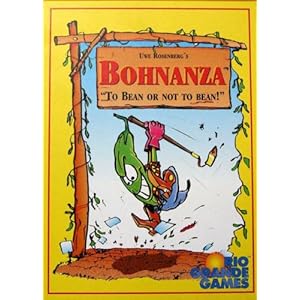When our friend Alan came back from a family reunion having seen not one but two groups of friends independently playing Bohnanza, we knew we needed to try it, and Alan bought his own copy immediately. On its surface, Bohnanza is a card game about trading, planting, and harvesting beans--and before criticizing it for missing the obvious "Beananza" pun, designer Uwe Rosenberg already thought of it, except in German, where "Bohne" means "bean".
That's the same Uwe Rosenberg who designed Agricola and Le Havre, so despite the game's cartoon graphics and family-friendly mechanics, Bohnanza is no slouch in the strategy department. Its basic mechanic is that you plant various types of beans in your field, and the more of the same type of bean you stack in the same field, the more points you get. The difficulty comes in that you can only plant two or three types of beans, and if you get stuck with a lousy one on your turn, you might be forced to harvest a more lucrative field prematurely. Fortunately, you're able to make trades, or straight-up give away cards to other players, to prevent such a disaster.
Where the game really sets itself apart is in one little restriction--the order of beans in your hand matters, and you must play the cards in the order you drew them. It's a little like Killer Bunnies in that sense, except that Bohnanza emphasizes making clever deals with other players to dump the dead weight from your hand. The possibility of asymmetric trades is another distinctive feature; unlike in Settlers of Catan, where each trade needs to resolve as soon as it's proposed, Bohnanza allows players to do each other favors in hopes that they'll net some positive karma and have a favor done for them eventually too.
I got destroyed in the only game of Bohnanza we've played, and it's because I didn't trade aggressively enough. It's easy to avoid trades in trading games, especially because you don't want to do something that results in your opponents netting advantages. Bohnanza, though, basically mandates that you cede advantage to the other players some of the time with the hope that they'll remember the kindness and cede it back later in the game.
Bohnanza's rules are incredibly simple, but it's so overwhelmingly social that it's probably impossible to "solve" it. There's certainly optimization decisions to be made, but the game much more strongly hinges on who can swing the best trades and land the most lucrative deals. It's easily picked up by a group of new players, and the pace is fast enough and the mechanics interactive enough that it's tough to get bored during the game. We'll be playing this one a lot, especially as a nice change of pace from ultra-complicated strategy board games.
2-7 players, 45-60 minutes, $20 at a gaming store or $15 on Amazon.

While I haven't played Bohnanza or Uwe Rosenberg's later successes in Agricola and Le Havre I am familiar with some of the concepts in each. Did you spot any ideas in Bohnanza that Uwe may have carried over to Agricola or Le Havre?
ReplyDeleteI'd imagine the 2 player option would require some rule adjustments to make it work.
The only mechanic that jumped out at me as being similar between Bohnanza and Agricola is that you have plots of land, and you often have to weigh the decision of whether to harvest crops immediately or let them grow for longer and earn a greater return. (I haven't played Le Havre.)
ReplyDeleteThere's also the decision of whether to upgrade your field and acquire a third farming plot--this costs money but can potentially be a positive or negative value investment in the long run. Agricola has lots of "I can sink resources into this now, but will it pay off?" mechanics, but I think that's common to a lot of games.
In the 2- and 3-player version, you get the third plot for free. I haven't yet played with 2 players, only 3, but I agree that playing the 2-player game would change the trading dynamic pretty drastically, if not necessarily the formal rules.
Bohnanza is one of the few games I know of that can support up to 7 players and do it reasonably well. It doesn't scale quite as well as 7 Wonders' simultaneous turns, but it moves quickly and keeps everyone involved. It's been a common game for me over the years due to its practical flexibility.
ReplyDeleteTotally agree, and thanks for the comment. I've found that with more than 4 players, the game slows down a lot, but maybe that's just because the people I play with tend to put a lot of thought into every decision.
ReplyDelete